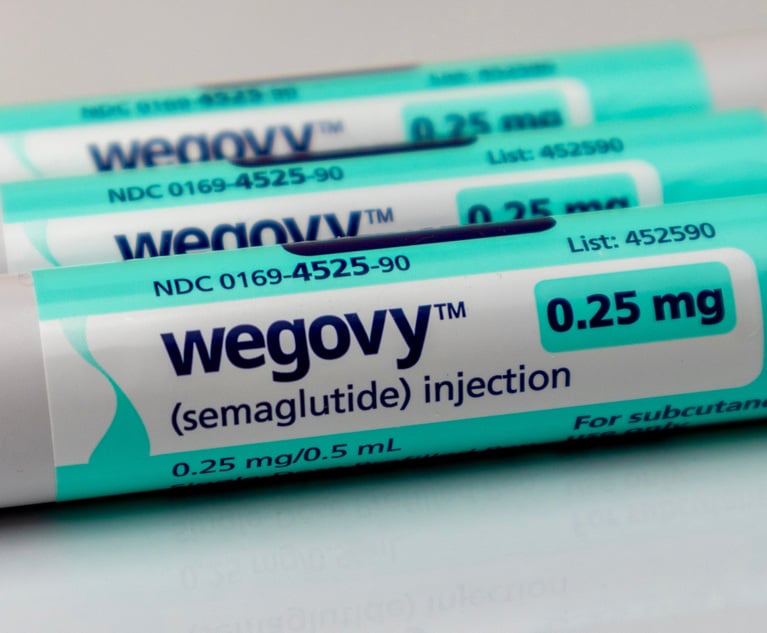Delaware Backs $1.6B Global Accord With Opioid Manufacturer Mallinckrodt
Mallinckrodt's "settlement framework" resolves thousands of claims brought by cities and counties in the multidistrict litigation and has the support of 47 attorneys general from states and U.S. territories.
February 25, 2020 at 03:07 PM
5 minute read
 Mallinckrodt Pharmaceuticals office in St. Louis. Photo: Whitney Curtis/AP Images for Mallinckrodt, File
Mallinckrodt Pharmaceuticals office in St. Louis. Photo: Whitney Curtis/AP Images for Mallinckrodt, File
Generic opiate manufacturer Mallinckrodt has agreed to pay $1.6 billion to settle all the lawsuits against it stemming from the opioid crisis, in a deal backed by 47 attorneys general from states and U.S. territories.
Tuesday's "settlement framework," which also resolves thousands of claims brought by cities and counties in the multidistrict litigation, is among the most significant global settlements by a corporation sued over the opioid crisis.
"Reaching this agreement in principle for a global opioid resolution and the associated debt refinancing activities announced today are important steps toward resolving the uncertainties in our business related to the opioid litigation," said Mark Trudeau, president and chief executive officer of Mallinckrodt, in a statement. "Importantly, when finalized, we believe the proposed settlement and capital restructuring activities will provide us with a clear path forward to achieving our long term strategy, preserving value for our financial stakeholders and providing us with the flexibility to operate effectively."
California Attorney General Xavier Becerra praised the deal Tuesday.
"Nothing can undo the devastating loss and grief inflicted by the opioid epidemic upon victims and their families, but this settlement with Mallinckrodt is an important step in the process of healing our communities," he said in a statement. "Our office has worked aggressively with our coalition partners to hold accountable bad actors who fueled this public health crisis. While today's settlement is a step in the right direction, we'll continue to work to bring more much-needed relief to families throughout California whose lives have been upended by the opioid crisis."
Georgia Attorney General Chris Carr made similar statements.
"This agreement with Mallinckrodt is just one example of the timely solutions needed in our fight against the opioid epidemic," he said. "Our office remains focused on holding accountable those who were responsible for fueling the epidemic and securing resources for victims."
Other states include Connecticut, Delaware, Florida, New Jersey, Pennsylvania, Texas and Washington D.C., according to Mallinckrodt's filings with the U.S. Securities and Exchange Commission.
Texas Attorney General Ken Paxton, whose office also filed opioid lawsuits against Purdue Pharma and Johnson & Johnson, said he was part of a bipartisan coalition of 40 states that served investigative subpoenas on eight companies that manufacture or distribute opiate pharmaceuticals, which are prescription painkillers.
"My office has been aggressively working to hold opioid manufacturers accountable for their deceptive marketing of highly addictive pain pills, which spurred an epidemic and left victims and families with unimaginable consequences," he said in a statement Wednesday. "My focus is on not only accountability, but also obtaining the resources we need to get victims of this epidemic the help they deserve."
The deal would include payments of $1.6 billion over eight years, of which $300 million would come after Mallinckrodt's "specialty generics" subsidiaries emerged from Chapter 11 bankruptcies. Mallinckrodt plc, which is based in England and has U.S. offices in St. Louis, said the agreement involves subsidiaries Mallinckrodt LLC, SpecGx LLC and other affiliates. Neither Mallinckrodt plc nor its "specialty brands" subsidiaries would be part of the bankruptcy.
Plaintiffs would receive another $200 million in the next two years and $150 million for each year after that.
The payments would be part of a trust that would serve as an abatement plan and could purchase shares in Mallinckrodt's subsidiaries once they emerged from Chapter 11.
The plaintiffs' executive committee in the multidistrict litigation negotiated the deal on behalf of thousands of other governments, most of which are cities and counties across the nation.
In an email, the plaintiffs' executive committee said the settlement was the result of a "deep dive" into Mallinckrodt's financial status.
"Such review can lead to the conclusion that a given defendant must consider bankruptcy as the only realistic resolution," wrote committee members Paul Farrell of The Farrell Law Firm, Paul Hanly of Simmons Hanly Conroy and Joe Rice of Motley Rice. "As result of the investigation into the financials and business of SPEC GX and the parent Mallinckrodt, the Plaintiffs' Executive Committee has reached an agreement in principle with drugmaker Mallinckrodt, which will resolve legal claims against the company while creating a mechanism for the company to fund abatement through a pre-arranged bankruptcy plan."
They added that, while the parties had reached a term sheet, they still need their clients to draft, finalize and approve the full agreement, "as the PEC can only recommend a resolution process."
This content has been archived. It is available through our partners, LexisNexis® and Bloomberg Law.
To view this content, please continue to their sites.
Not a Lexis Subscriber?
Subscribe Now
Not a Bloomberg Law Subscriber?
Subscribe Now
NOT FOR REPRINT
© 2025 ALM Global, LLC, All Rights Reserved. Request academic re-use from www.copyright.com. All other uses, submit a request to [email protected]. For more information visit Asset & Logo Licensing.
You Might Like
View All
Wilson Sonsini Knocks Out Claims Against Inhibrx Biosciences in Trade Secrets Verdict


Chancery Again Rules in Plaintiff's Favor in Earnout Provision Dispute
3 minute read
Novo Nordisk Files Patent Claims to Fend off Generic Rivals of Wegovy
3 minute readLaw Firms Mentioned
Trending Stories
Who Got The Work
Michael G. Bongiorno, Andrew Scott Dulberg and Elizabeth E. Driscoll from Wilmer Cutler Pickering Hale and Dorr have stepped in to represent Symbotic Inc., an A.I.-enabled technology platform that focuses on increasing supply chain efficiency, and other defendants in a pending shareholder derivative lawsuit. The case, filed Oct. 2 in Massachusetts District Court by the Brown Law Firm on behalf of Stephen Austen, accuses certain officers and directors of misleading investors in regard to Symbotic's potential for margin growth by failing to disclose that the company was not equipped to timely deploy its systems or manage expenses through project delays. The case, assigned to U.S. District Judge Nathaniel M. Gorton, is 1:24-cv-12522, Austen v. Cohen et al.
Who Got The Work
Edmund Polubinski and Marie Killmond of Davis Polk & Wardwell have entered appearances for data platform software development company MongoDB and other defendants in a pending shareholder derivative lawsuit. The action, filed Oct. 7 in New York Southern District Court by the Brown Law Firm, accuses the company's directors and/or officers of falsely expressing confidence in the company’s restructuring of its sales incentive plan and downplaying the severity of decreases in its upfront commitments. The case is 1:24-cv-07594, Roy v. Ittycheria et al.
Who Got The Work
Amy O. Bruchs and Kurt F. Ellison of Michael Best & Friedrich have entered appearances for Epic Systems Corp. in a pending employment discrimination lawsuit. The suit was filed Sept. 7 in Wisconsin Western District Court by Levine Eisberner LLC and Siri & Glimstad on behalf of a project manager who claims that he was wrongfully terminated after applying for a religious exemption to the defendant's COVID-19 vaccine mandate. The case, assigned to U.S. Magistrate Judge Anita Marie Boor, is 3:24-cv-00630, Secker, Nathan v. Epic Systems Corporation.
Who Got The Work
David X. Sullivan, Thomas J. Finn and Gregory A. Hall from McCarter & English have entered appearances for Sunrun Installation Services in a pending civil rights lawsuit. The complaint was filed Sept. 4 in Connecticut District Court by attorney Robert M. Berke on behalf of former employee George Edward Steins, who was arrested and charged with employing an unregistered home improvement salesperson. The complaint alleges that had Sunrun informed the Connecticut Department of Consumer Protection that the plaintiff's employment had ended in 2017 and that he no longer held Sunrun's home improvement contractor license, he would not have been hit with charges, which were dismissed in May 2024. The case, assigned to U.S. District Judge Jeffrey A. Meyer, is 3:24-cv-01423, Steins v. Sunrun, Inc. et al.
Who Got The Work
Greenberg Traurig shareholder Joshua L. Raskin has entered an appearance for boohoo.com UK Ltd. in a pending patent infringement lawsuit. The suit, filed Sept. 3 in Texas Eastern District Court by Rozier Hardt McDonough on behalf of Alto Dynamics, asserts five patents related to an online shopping platform. The case, assigned to U.S. District Judge Rodney Gilstrap, is 2:24-cv-00719, Alto Dynamics, LLC v. boohoo.com UK Limited.
Featured Firms
Law Offices of Gary Martin Hays & Associates, P.C.
(470) 294-1674
Law Offices of Mark E. Salomone
(857) 444-6468
Smith & Hassler
(713) 739-1250






